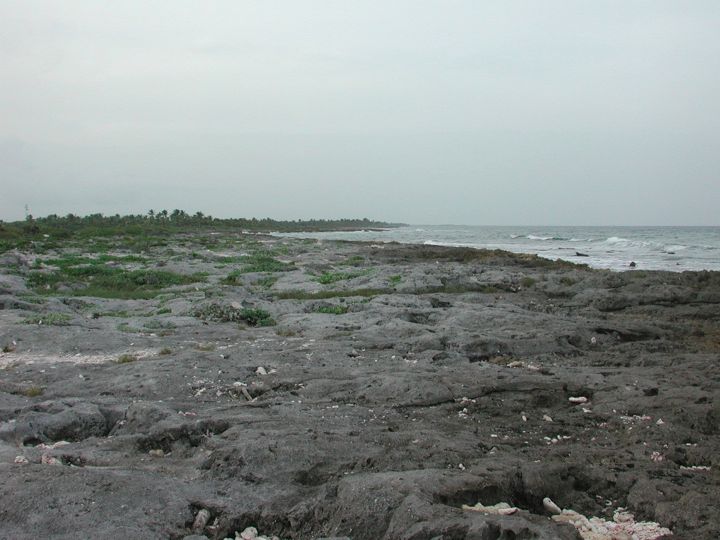There is a nice article in the NYT today by Justin Gillis about new research designed to answer this question. The team is identifying fossil beaches from the pliocene (~ 3 millions years ago) that were formed when the atmospheric concentration of carbon dioxide was (naturally) what it is now (not naturally). Then, as now, the relatively high CO2 concentration led to global warming and thus sea level rise. (note, Iv’e got a primer here, Sea Level Rise 101) The preliminary results are shocking – in short, as we’ve been warning, we are in for a heap of new oceanfront property.
This approach is not new. Many teams of scientists have looked at past natural warming and sea level high marks to try to get a handle on a rate and extent of sea level rise for various CO2 scenarios. One that I run across in nature pretty frequently is the fossil coral reefs seen on shorelines throughout the Caribbean and southeast Florida:
These are reefs that formed during the last intergalcial period, about 110,000 years ago, before the last ice age. They are about 20 feet above where the reefs of today are because sea level then was higher than today. Why? Because the earth was about 1C warmer than today (due to the proximity of the earth to the sun and not to elevated CO2). This period isn’t a perfect analogue for our current dilemma, but like other past natural warming events, it gives us a sense of where sea level is headed.
Anyway, here is Justin’s piece, excerpted below.
In previous research, scientists have determined that when the earth warms by only a couple of degrees Fahrenheit, enough polar ice melts, over time, to raise the global sea level by about 25 to 30 feet. But in the coming century, the earth is expected to warm more than that, perhaps four or five degrees, because of human emissions of greenhouse gases.
Experts say the emissions that may make a huge increase of sea level inevitable are expected to occur in just the next few decades. They fear that because the world’s coasts are so densely settled, the rising oceans will lead to a humanitarian crisis lasting many hundreds of years.
To add to that body of knowledge, Dr. Raymo is studying geologic history going back several million years. The earth has warmed up many times, for purely natural reasons, and those episodes often featured huge shifts of climate, partial collapse of the polar ice sheets and substantial increases in sea level.
“I wish I could take people that question the significance of sea level rise out in the field with me,” Dr. Raymo said. “Because you just walk them up 30 or 40 feet in elevation above today’s sea level and show them a fossil beach, with shells the size of a fist eroding out, and they can look at it with their own eyes and say, ‘Wow, you didn’t just make that up.’ ”

Leave a Reply